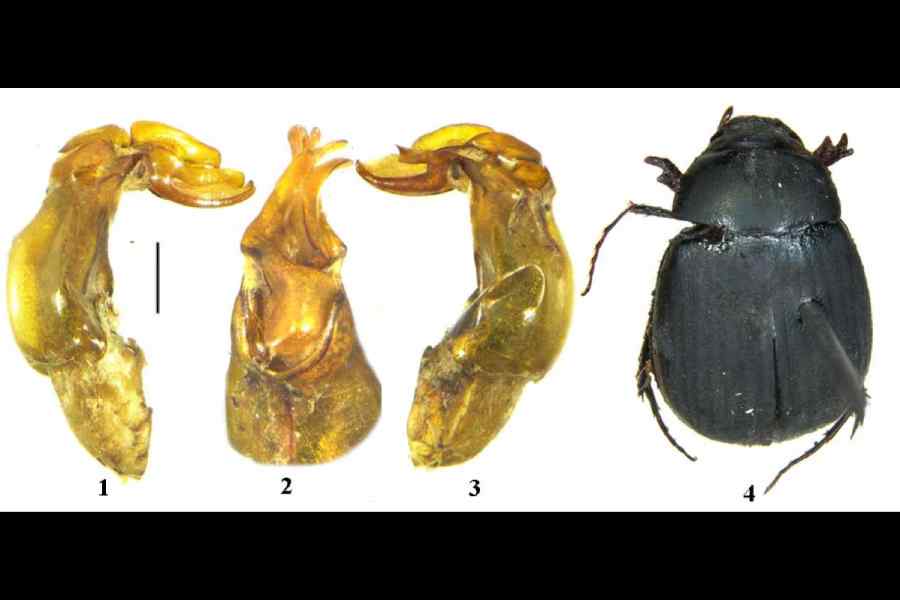The beetle
Sir — The ignominy of Behala — it is known for all things bad, from waterlogging and traffic congestion to dengue outbreaks — might finally be lessened by the discovery of a new species of beetle found only in this area. Scientists from the Zoological Survey of India have discovered the new beetle and have even offered it as a Puja gift to the city. Bengalis who constantly gripe about being deprived of fame can now find solace in the fact that this black beetle has been named Maladera kolkataensis in honour of Calcutta. But one hopes that this prestige will translate to more than just cultural pride. Perhaps the next time a Bengali spots a gubre poka, he or she will take care not to squash it as beetles play a key role in the ecological chain.
Sukhen Das, Calcutta
Empty promise
Sir — The claim of the prime minister, Narendra Modi, that the Bharatiya Janata Party is working to create a “marvellous Mizoram” is hardly believable. Many such promises made by the prime minister have proven to be hollow in the past. Take, for instance, the promise of development in Manipur powered by a ‘double-engine sarkar’ which has been brutally broken. The Centre’s inaction against Brij Bhushan Sharan Singh, the former chief of the Wrestling Federation of India, who is accused of sexually assaulting women wrestlers, also flies in the face of its claims of ‘Beti Bachao, Beti Padhao’. Political rhetoric is designed to give a sense of solidity to pure wind and Modi speaks this tongue fluently.
Avinash Godboley, Dewas, Madhya Pradesh
Deserved honour
Sir — Kozhikode, a culturally vibrant city in Kerala, has been bestowed the title, ‘City of Literature’, by Unesco. It is a well-deserved honour. The city has more than 500 public libraries, thriving bookstores and a long tradition of kolaya (veranda) gatherings where people engage in informal and free-flowing discussions on politics and arts. Kozhikode also boasts of literary giants like M.T. Vasudevan Nair, Muhammad Basheer and P. Valsala. While many cities offer greater economic prospects for their residents, they are rarely repositories of cultural treasures. The achievement underlines how urban planning can be key to bolstering creativity.
M. Jeyaram, Sholavandan, Tamil Nadu
Failed welfare
Sir — Data released by the National Statistical Office have revealed a downward trend in two of the Centre’s flagship programmes for rural India (“2 welfare schemes stutter”, Nov 6). These are the Pradhan Mantri Awas Yojana Grameen and the Deendayal Antyodaya Yojana-National Rural Livelihood Mission. Adequate housing facilities and the availability of bank loans at lower rates are important demands of rural voters. Limited success in schemes related to these issues is thus the result of public unawareness, which, in turn, can be attributed to irresponsible government officials. The strained relationship between the Centre and some states has also contributed to the problem. The Centre must prioritise the interest of the citizens over political conflicts.
Aayman Anwar Ali, Calcutta
Costly bite
Sir — The price of onions in Calcutta has doubled in the last week. The recent price hike has been caused by the fear of excessive traffic restrictions on heavy vehicles before Kali Puja (“Onion prices go up and up”, Nov 6). Owing to this and the money extorted from drivers, most trucks transporting produce avoid the city during this time. Sufal Bangla stalls, which provide onions at the fixed rate of Rs 55, are few and far between and cannot be accessed by most people in the city. The markets must thus be adequately monitored to keep a check on excessive pricing around this time of the year. Furthermore, the traffic police should facilitate the ease of movement of heavy trucks carrying essential commodities.
D. Bhattacharyya, Calcutta
Ride safe
Sir — It is unfortunate that an 18-year-old girl was recently injured when the car she was travelling in collided with a lamp post (“Teen’s injuries bare need for rear seat belt”, Nov 5). Her injuries could have been averted if she had worn a seat belt. It is thus crucial to wear seat belts even in the rear seat of the vehicle. The police should be more vigilant about this.
Ananda Dulal Ghosh, Howrah
Uneven burden
Sir — Developed countries are responsible for 83% of the total carbon emissions in the world and must be held accountable for this. Developing nations like India that cannot afford to slow down manufacturing find it harder to cut back on carbon emissions. According to a recent estimate, Norway and Belarus are the only two countries slated to reach their emission reduction targets. What about the other polluters?
Dattaprasad Shirodkar, Mumbai
Thoughtful gesture
Sir — The governor of West Bengal, C.V. Ananda Bose, welcomed to the Raj Bhavan 500 cricket fans who were unable to get tickets for the World Cup match between India and South Africa at the Eden Gardens. The people watched the game on wide screens inside the premises. Bose’s thoughtful gesture must be lauded.
Sourish Misra, Calcutta
Festival of lights
Sir — Diwali, the festival of lights, has become an occasion to burst loud crackers that are polluting. This inconveniences both people and animals. The real purpose of the festival is to brighten our own and others’ lives by exchanging meaningful gifts like books or donating to charities. The darkness of communal hatred can only be battled with the light of education.
Brij B. Goyal, Ludhiana











